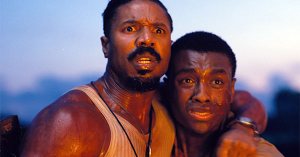Total Recall: Chris Rock’s Best Movies
We count down the best-reviewed work of the Death at a Funeral star.

Most of his best-known routines are unprintable in polite company, but that hasn’t prevented Chris Rock from building a career as one of the best-known and most versatile comics of his generation — from television (including a stint on Saturday Night Live and an Emmy-winning HBO talk show) to his recording career (including 1997’s Grammy-winning Roll with the New) to his steadily expanding list of film credits, Rock has been making people laugh — and making them think — for nearly 20 years. To celebrate the release of his latest big-screen comedy, Neil LaBute’s Death at a Funeral remake, we decided to take a look through Rock’s filmography and find its ten freshest entries. It’s time for Total Recall!
10. Bee Movie
It had the benefit of almost 10 years’ worth of Seinfeld nostalgia, a huge promotional campaign, and a series of teasers featuring its stars dressed up in funny giant bug costumes. It had a voice cast that included Jerry Seinfeld, Renee Zellweger, Matthew Broderick, and Chris Rock as a mosquito named Mooseblood. So why did Bee Movie end up looking like a disappointment despite its $366 million gross? In all likelihood, Seinfeld would have had a hard time meeting expectations with anything he did after so much time away, but Bee‘s hyperactive plot and punny, kid-targeted gags struck a sour note with fans of his stand-up act and long-running sitcom. Still, some critics were able to appreciate the film for what it was — like Christian Toto of the Washington Times, who wrote, “Bee Movie is a light, moderately entertaining romp. Not that there’s anything wrong with that.”
9. Lethal Weapon 4
Rock added “action hero” to his resume with his appearance in the fourth Lethal Weapon, which gave him the role of Lee Butters, the police detective who secretly marries the daughter of Roger Murtaugh (Danny Glover). Though Lethal Weapon 4‘s script didn’t give Rock many opportunities to exercise his famously acerbic wit, it let him do something almost as funny — namely, spend two hours quaking in fear of Glover — and put him on the screen for one of the year’s biggest box office successes. By this point in the series, many critics felt Lethal Weapon was empty, but for some, the addition of Rock and Jet Li to the time-tested chemistry of Glover and Mel Gibson was enough to keep things entertaining. None were more surprised than Janet Maslin of the New York Times, who wrote, “Pardon me for having groaned in anticipation of what, in the full perspective-warping heat of the summer movie season, turns out to be one of the nicer blow-’em-ups around.”
8. Osmosis Jones
The Farrelly brothers, Bill Murray, and Chris Rock, together in one picture — it’s gotta be great, right? Well, yes and no. Osmosis Jones was the Farrellys’ bid for family-friendly fare, starring Murray as a slovenly widower whose disgusting habits leave his body vulnerable to the dastardly virus Thrax (voiced by Laurence Fishburne), and trigger the heroic efforts of the titular white blood cell (voiced by Chris Rock). It was a nifty premise, one made all the more intriguing thanks to its split between live action scenes (starring Murray, Molly Shannon, and Chris Elliott) and animated sequences (featuring the voices of Rock, Fishburne, and William Shatner); unfortunately, audiences delivered it the same disastrous fate suffered by Warner Bros. Animation’s previous release, The Iron Giant. Fortunately, critics were a bit kinder — though some were turned off by the Farrellys’ ever-scatalogical humor, a number of writers praised Osmosis‘ borderline educational storyline, as well as its likable cast. “I’d advise attendees of this film to go on an empty stomach,” wrote John R. McEwen of Film Quips Online, “but if you’re willing to endure the Farrellys’ warped sense of humor and Murray’s scratching, squirting, gas-passing antics, Osmosis Jones offers some lighthearted fun.”
7. Madagascar
Rock returned to animation with this DreamWorks Animation hit, which found him voicing Marty, a zebra whose quest to escape the Central Park Zoo leads to him being forcibly deported to Kenya with his friends Alex the lion (Ben Stiller), Melman the giraffe (David Schwimmer), and Gloria the hippo (Jada Pinkett Smith), along with a trio of penguins. Of course, the trip doesn’t go as planned — the movie’s called Madagascar, after all — but the whole thing worked like a charm for DreamWorks, where the $532 million gross guaranteed sequels and spinoffs galore. (The third Madagascar is scheduled to arrive in theaters in 2012.) Critics were generally indifferent to its charms, but for some, the movie’s journey was one worth taking; as Tasha Robinson of the AV Club observed, “The tenor can be shrill, but there’s no time to get bored. And on top of that, most of the gags actually work.”
6. CB4
It’s been described as a sort of hip-hop take on This Is Spinal Tap, but CB4 probably has more in common with absurdist pop music comedies like Airheads and Wayne’s World. Rock, who co-wrote the script, stars as a wannabe rapper named Albert, whose desperate quest for rap stardom leads him to co-opt the identity of a recently imprisoned local gangster (Charlie Murphy) and use his street cred to score hardcore hits like the immortal “Straight Outta Locash.” Given the satire-ready subject matter, Rock’s heightened visibility during his early ’90s Saturday Night Live run, and a cast that included Phil Hartman and Chris Elliott, CB4 should have been the start of something big for Rock; instead, its middling box office and lukewarm reviews kicked off a string of bit roles in films like Sgt. Bilko. It’s survived as something of a cult classic on home video, though, bearing out the predictions of critics like the Washington Post’s Desson Thomson, who wrote, “If your mood is loose and profane, if you speak hip-hop (or you just like hearing it) and if you think Rock is funny (he is), you’ll be glad you checked this out.”
5. Madagascar: Escape 2 Africa
After Madagascar raked in hundreds of millions of dollars at the box office (and proved to be an eminently merchandisable cash magnet for DreamWorks), a follow-up was inevitable — but unlike most sequels, 2008’s Madagascar: Escape 2 Africa was a bigger box office hit and enjoyed significantly better reviews than its predecessor. Here, Rock and his co-stars send their voices to Africa, where their animal characters meet up with a pride of lions (including Alec Baldwin and Sherri Shepherd) and one suave hippo (voiced by the Black Eyed Peas’ will.i.am, who contributed heavily to the soundtrack). Even as it hurled pop culture gags at the screen, sold countless tie-ins, and set up yet another sequel, Escape 2 Africa added new layers of depth and humor to the original, much to the surprise of critics like the Toronto Star’s Peter Howell, who wrote, “It has everything Madagascar had three years ago, but also two things the original was woefully lacking: a good yarn and genuine yuks.”
4. Dogma
He’s in a bit of a fallow period now, but it wasn’t so long ago that Kevin Smith had an imagination so fearless it could dream up the kind of movie that would inspire public condemnation — not to mention death threats — from people who hadn’t even seen it. We’re talking about Dogma, the 1999 comedy in which Smith pits a pair of exiled angels (Ben Affleck and Matt Damon) against a ragtag group that includes a Greek muse turned stripper (Salma Hayek), the heretofore unknown 13th apostle (Chris Rock), Jesus Christ’s last surviving relative (Linda Fiorentino), and a pair of unwitting prophets (Jason Mewes and Smith as, of course, Jay and Silent Bob) — all while God (played by Alanis Morissette, natch) lies trapped in the comatose body of a homeless man (s)He was using to play skee ball. Not for the easily offended, obviously — but despite what Dogma‘s detractors may have thought, Smith didn’t go for cheap gags, instead using humor to leaven a thoughtful look at what we believe, and why. “Make no mistake,” cautioned TV Guide’s Maitland McDonagh, “Kevin Smith’s talky, farcical comedy of cosmic errors is clever. But it’s clever in a deeply juvenile way.”
3. New Jack City
Rock earned his first real screen time in Mario Van Peebles’ 1991 drug drama, playing the ill-fated police informant Benny “Pookie” Robinson, who tries to help NYPD detectives Scotty Appleton (Ice-T) and Nick Peretti (Judd Nelson) infiltrate the crack-spewing CMB gang, led by the vicious Nino Brown (Wesley Snipes). Pookie is unsuccessful in his efforts, to put it mildly, but New Jack City was a huge hit, racking up almost $50 million in domestic grosses, earning widespread critical praise, and spun off a soundtrack that became one of the top-selling albums of the year, thanks in part to a huge hit single from the other CMB (aka Color Me Badd). Roger Ebert was one of the many critics who enjoyed Peebles’ City, writing, “The movie was advertised (no doubt wisely) as a slam-bang action adventure, but in fact it’s a serious, smart film with an impact that lingers after the lights go up.”
(Warning: NSFW — language.)
2. Nurse Betty
Chris Rock has taken his fair share of lumps for appearing in middle-of-the-road comedies like I Think I Love My Wife and Head of State, but occasionally, he reminds us that he has a sharper eye for scripts than you might suspect. Case in point: Nurse Betty, a wickedly dark, Neil LaBute-directed comedy about a slightly addled waitress (Renee Zellweger) who comes unglued from reality when she witnesses her husband (Aaron Eckhart) being murdered by a pair of hit men (Rock and Morgan Freeman). A strange blend of The Wizard of Oz-style fantasy and bloody, Tarantino-esque violence, Nurse Betty baffled audiences, but the black humor of John C. Richards’ script, coupled with uniformly strong performances from a cast that also included Greg Kinnear and Allison Janney, made it one of the year’s better-reviewed films. Wrote Jules Brenner of Cinema Signals, “Carried by Renee Zellweger whose particular forte is unquestioned honesty, directness and guilelessness, supported by no less than Morgan Freeman in a semi-comedic turn and Chris Rock in a semi-serious turn, it’s a rare entertainment.”
1. Good Hair
Shaken after his five-year-old daughter asked him why she didn’t have “good hair,” Rock spearheaded this thoughtful, yet lighthearted, look at the complicated emotions — and the huge industry — surrounding the issue of hair in the black community. Following weaves to their (ahem) roots in India, examining just what goes into chemical hair relaxers, and interviewing a host of celebrities (including Ice-T, Paul Mooney, Maya Angelou, and Al Sharpton), Rock was able to take the gifts for social commentary and comedy that made him so appealing on record and HBO, and bring them — arguably for the first time — to the big screen. Though a few critics felt Good Hair didn’t take its subject seriously enough, the vast majority appreciated the even-handed way Rock chose to address a complex, largely taboo subject. “If you arrive at Good Hair never having thought about the complexities of black hair, bring a notebook,” warned Wesley Morris of the Boston Globe. “If you are a black woman wearing a weave, bring a tissue.”
In case you were wondering, here are Rock’s top ten movies according RT users’ scores:
1. Good Hair — 84%
2. Dogma — 83%
3. New Jack City — 78%
4. Madagascar: Escape 2 Africa — 76%
5. Nurse Betty — 69%
6. Lethal Weapon 4 — 68%
7. Madagascar — 66%
8. CB4 — 62%
9. Bee Movie — 58%
10. The Longest Yard — 54%
Take a look through Rock’s complete filmography, as well as the rest of our Total Recall archives. And don’t forget to check out the reviews for Death at a Funeral.
Finally, here’s Rock with David Letterman talking about Oprah:
















